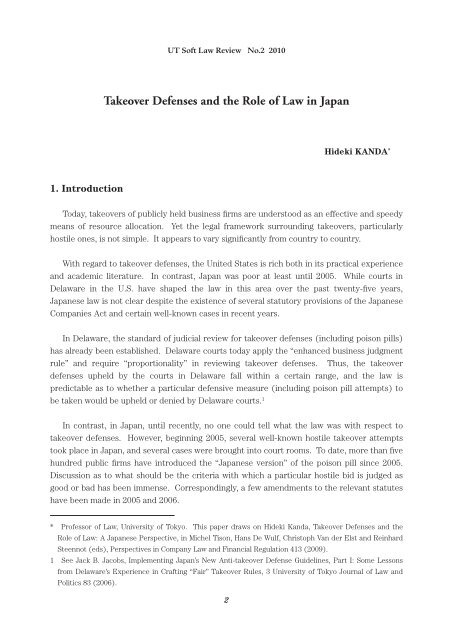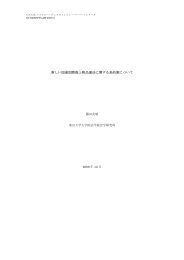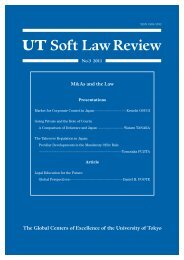UT Soft Law Review
UT Soft Law Review
UT Soft Law Review
You also want an ePaper? Increase the reach of your titles
YUMPU automatically turns print PDFs into web optimized ePapers that Google loves.
<strong>UT</strong> <strong>Soft</strong> <strong>Law</strong> <strong>Review</strong> No.2 2010Takeover Defenses and the Role of <strong>Law</strong> in JapanHideki KANDA *1. IntroductionToday, takeovers of publicly held business firms are understood as an effective and speedymeans of resource allocation. Yet the legal framework surrounding takeovers, particularlyhostile ones, is not simple. It appears to vary significantly from country to country.With regard to takeover defenses, the United States is rich both in its practical experienceand academic literature. In contrast, Japan was poor at least until 2005. While courts inDelaware in the U.S. have shaped the law in this area over the past twenty-five years,Japanese law is not clear despite the existence of several statutory provisions of the JapaneseCompanies Act and certain well-known cases in recent years.In Delaware, the standard of judicial review for takeover defenses (including poison pills)has already been established. Delaware courts today apply the “enhanced business judgmentrule” and require “proportionality” in reviewing takeover defenses. Thus, the takeoverdefenses upheld by the courts in Delaware fall within a certain range, and the law ispredictable as to whether a particular defensive measure (including poison pill attempts) tobe taken would be upheld or denied by Delaware courts. 1In contrast, in Japan, until recently, no one could tell what the law was with respect totakeover defenses. However, beginning 2005, several well-known hostile takeover attemptstook place in Japan, and several cases were brought into court rooms. To date, more than fivehundred public firms have introduced the “Japanese version” of the poison pill since 2005.Discussion as to what should be the criteria with which a particular hostile bid is judged asgood or bad has been immense. Correspondingly, a few amendments to the relevant statuteshave been made in 2005 and 2006.* Professor of <strong>Law</strong>, University of Tokyo. This paper draws on Hideki Kanda, Takeover Defenses and theRole of <strong>Law</strong>: A Japanese Perspective, in Michel Tison, Hans De Wulf, Christoph Van der Elst and ReinhardSteennot (eds), Perspectives in Company <strong>Law</strong> and Financial Regulation 413 (2009).1 See Jack B. Jacobs, Implementing Japan’s New Anti-takeover Defense Guidelines, Part I: Some Lessonsfrom Delaware’s Experience in Crafting “Fair” Takeover Rules, 3 University of Tokyo Journal of <strong>Law</strong> andPolitics 83 (2006).2





